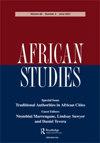Urbanised Ageing and Strategic Welfare Space in a Namibian Former Township
IF 1
4区 社会学
Q2 AREA STUDIES
引用次数: 0
Abstract
ABSTRACT The number of African older people who live permanently in urban areas is growing. This qualitative ethnographic study explores how older people employ welfare strategies, often involving members of the extended family in mutual care and support. These welfare strategies are emplaced; in this case, in different housing types in a former township in Namibia – Kuisebmond in Walvis Bay. Older people stay in former township houses, in backyard shacks or other rentals, or at an old-age home. Government welfare that was adjusted to family needs appeared in similar shapes in these housing types, such as access to better schools. Older people were both caregivers and receivers of care in these efforts. Taking care of grandchildren while their parents migrated for work was a mutuality of informal support that was highly beneficial to all involved. The non-contributory pensions facilitated many strategies by alleviating risks. Access to high quality housing and government healthcare made urban living a feasible alternative that challenged rural living. The study concludes that housing is a strategic welfare space where formal and informal welfare are optimised in various ways. Older individuals contribute to a large extent to the adjustment, maintenance, and development of these joint spaces.纳米比亚旧镇的城市化老龄化与战略福利空间
长期居住在城市地区的非洲老年人数量正在增长。这个定性的民族志研究探讨了老年人如何使用福利策略,通常涉及大家庭成员的相互照顾和支持。这些福利战略被安置;在这种情况下,在纳米比亚沃尔维斯湾的Kuisebmond的一个前乡镇的不同类型的住房中。老年人住在以前的乡镇房屋、后院的棚屋或其他出租房屋,或者住在养老院。根据家庭需求调整的政府福利在这些住房类型中也以类似的形式出现,比如进入更好的学校。在这些努力中,老年人既是照顾者又是接受照顾者。在他们的父母外出工作时照顾孙子孙女是一种非正式的相互支持,对所有参与的人都非常有益。非缴费养恤金通过减轻风险促进了许多战略。获得高质量住房和政府医疗保健使城市生活成为挑战农村生活的可行选择。研究得出结论,住房是一个战略性的福利空间,在这里,正式和非正式的福利以各种方式得到优化。老年人在很大程度上有助于这些关节空间的调整、维持和发展。
本文章由计算机程序翻译,如有差异,请以英文原文为准。
求助全文
约1分钟内获得全文
求助全文

 求助内容:
求助内容: 应助结果提醒方式:
应助结果提醒方式:


